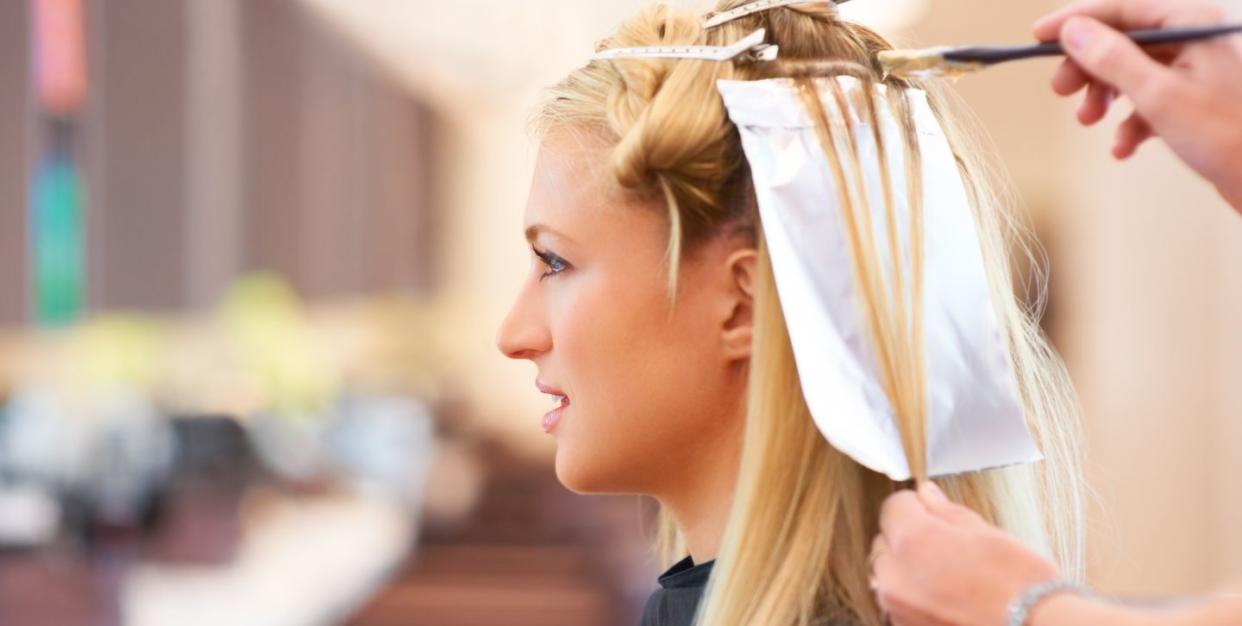Some Hair Dyes and Chemical Straighteners May Increase Breast Cancer Risk, Study Says

The findings of a new study will have your salon buzzing: Permanent hair dyes and chemical hair straighteners may be associated with a higher risk of breast cancer in women, according to research published in the International Journal of Cancer.
For the study, researchers at the National Institute of Health used data from 46,709 American women who are enrolled in the Sister Study (a study that features cancer-free women whose sisters had been diagnosed with breast cancer).
The women were asked questions about various lifestyle factors—including what types of hair products they used in the past year—and provided updates over an average period of eight years. More than half of the women said they used permanent hair dyes in the year before they started the study and about 10% said they’d used chemical hair straighteners.
The researchers found that women who used permanent hair dye were 9% more likely to develop breast cancer than women who didn’t dye their hair. But the risk was significantly higher in one particular group: Black women who used permanent hair dye had a 45% higher risk and, when they used them every eight weeks or more, they had a 60% higher risk.
Women who used chemical hair straighteners also had a 18% higher risk of breast cancer.
If you dye or chemically straighten your hair, it’s understandable that you might be freaked out by this—but experts say you shouldn’t panic just yet. Here’s everything you need to know about the link between these hair treatments and breast cancer.
How could permanent hair dyes and chemical straighteners increase cancer risk?
Unfortunately, the study didn’t determine why, exactly, this link exists, but there are some theories. First, the increased risk may be due to certain chemicals found in hair dyes and straighteners, says Kristen D. Whitaker, M.D., M.S., an assistant professor at the Fox Chase Cancer Center. She points to aromatic amines, which are chemicals that, in addition to commercial hair dyes, are also found in tobacco smoke and diesel exhaust.
Think about it: There are thousands of these products on the market, all of which have different formulations—and for the most part, they’re completely unregulated by the Food and Drug Administration.
Experts believe some of the chemicals found in hair dyes and chemical straighteners can damage your DNA, says Kathleen Egan, Sc.D., an epidemiologist at Moffitt Cancer Center. “For breast cancer, the concern relates to the possibility that these chemicals can behave like estrogens in the body, and lifetime estrogen exposure is known to be the main contributor to breast cancer in women,” she explains.
As for why black women might be disproportionately impacted, it could come down to a number of factors. “Some studies have shown that products used by black women may have more of the potentially harmful chemicals,” Dr. Whitaker says. “Black women also tend to use hair products, such as straighteners, more frequently than white women.” (In this most recent study, for instance, 74% of black women reported using chemical straighteners compared to 3% of white women.)
Black women, in general, are also up to 40% more likely to die from breast cancer, potentially due to genetics, how the cancer forms, and differences in healthcare.
But ultimately, these are all just theories. It’s worth noting that the women studied all had a sister with breast cancer, meaning they already had a higher risk of developing the disease compared to women who don’t have a first-degree genetic link.
Research has also been conflicting. “Most studies have found that these products did not significantly increase risk of cancer,” Dr. Whitaker adds. “However, this most recent study was a large, well-conducted study that provides stronger evidence for an association between hair dye/hair straightener use and breast cancer.”
So, should you stop coloring and straightening your hair?
It’s definitely worth keeping this link in mind, but you shouldn’t panic. “These findings suggest that women should consider their use of hair products in light of the fact that the chemicals in hair dye and chemical straighteners may influence their risk of developing breast cancer,” says study author Alexandra White, Ph.D., head of the Environment and Cancer Epidemiology Group of the National Institute of Environmental Health Sciences.
“However, the overall risk is not large and chemical hair products are just one of many factors that may influence a woman’s chances of getting breast cancer,” she adds “More research is needed before firm recommendations can be made.”
Dr. Whitaker agrees. “There are many risk factors for breast cancer—some we can control, like being overweight or drinking significant amounts of alcohol, and some we cannot, such as being a women or getting older,” she says.
The bottom line? It’s really too soon to say. But if you’re really worried about the risk, coloring or straightening your hair is a personal decision, and it’s up to you on whether you continue to do so.
Ultimately, experts recommend doing your best to focus on factors that are known to reduce your risk of developing breast cancer, like exercising regularly, eating a nutrient-rich diet, and avoiding smoking, says Janie Grumley, M.D., a breast surgical oncologist and director of the Margie Petersen Breast Center at Providence Saint John’s Center in Santa Monica, Calif.
“There are so many other things you can do that have a bigger impact on your general health and breast cancer risk,” she says. Read up on how to keep breast cancer out of your future here.
Like what you just read? You’ll love our magazine! Go here to subscribe. Don’t miss a thing by downloading Apple News here and following Prevention. Oh, and we’re on Instagram too.
You Might Also Like

